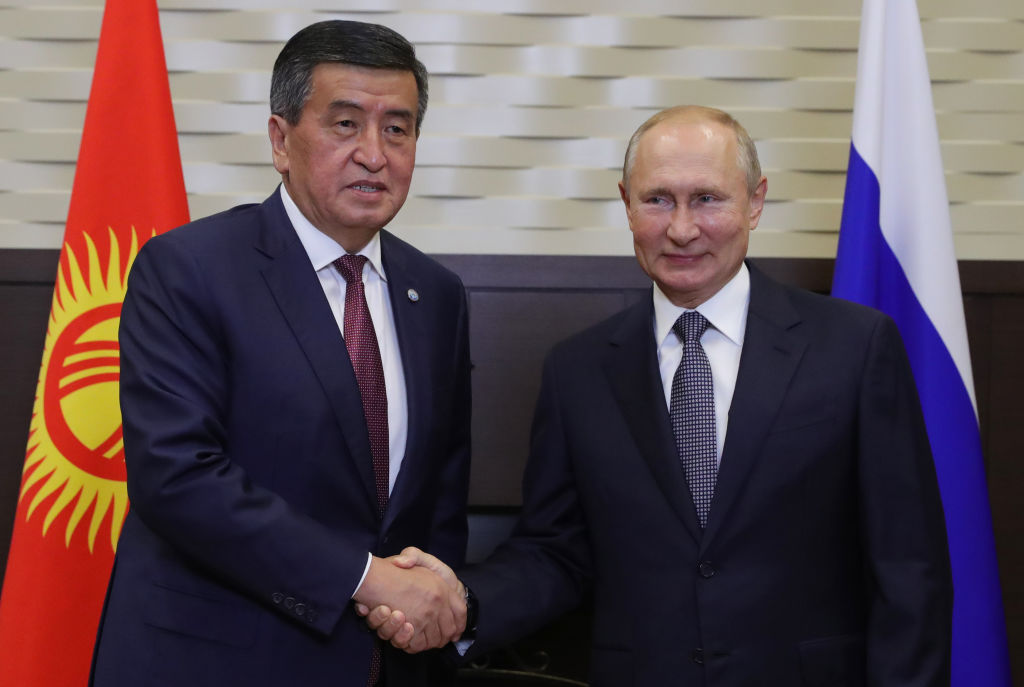Kyrgyzstan president resigns amid political unrest after disputed election


A free daily email with the biggest news stories of the day – and the best features from TheWeek.com
You are now subscribed
Your newsletter sign-up was successful
Sooronbai Jeenbekov, president of Kyrgyzstan, announced his resignation Thursday, potentially defusing one of at least three crises in Russia's sphere of influence. Kyrgyzstan, which borders China and Russia, has been in turmoil since a disputed Oct. 4 parliamentary election. The national election commission declared a victory for pro-government parties, then nullified the election when anti-government protesters revolted, claiming vote-buying and other irregularities. Jeenbekov is the third Kyrgyzstan president ousted in a popular uprising since 2005.
Jeenbekov said he has agreed to step down to avoid bloodshed. Protesters already overran several government buildings over the past week, and if they follow through on threats to seize the president's house, "the military and security forces will be obliged to use their weapons to protect the state residence," he said. "Blood will be inevitably shed," and holding on to power is not "worth the integrity of our country and harmony in society."
After days of unrest in the capital, Bishkek, Jeenbekov passed a state of emergency. On Wednesday, he sought to calm the protests by agreeing to appoint Sadyr Zhaparov, a nationalist former lawmaker freed from jail last week by demonstrators, as prime minister. "The president couldn't hold out," Dastan Bekeshev, a lawmaker who supports neither Jeenbekov or Japarov, told Reuters by phone. "He's very weak. No spirit. It's not clear what happens next, nobody can tell what is going to happen."
The Week
Escape your echo chamber. Get the facts behind the news, plus analysis from multiple perspectives.

Sign up for The Week's Free Newsletters
From our morning news briefing to a weekly Good News Newsletter, get the best of The Week delivered directly to your inbox.
From our morning news briefing to a weekly Good News Newsletter, get the best of The Week delivered directly to your inbox.
Kyrgyzstan is an ally of Moscow and houses a Russian military base. The Kremlin had said it will ensure stability in the country, even as it deals with a disputed election in Belarus and fighting between Armenia and Azerbaijan.
A free daily email with the biggest news stories of the day – and the best features from TheWeek.com
Peter has worked as a news and culture writer and editor at The Week since the site's launch in 2008. He covers politics, world affairs, religion and cultural currents. His journalism career began as a copy editor at a financial newswire and has included editorial positions at The New York Times Magazine, Facts on File, and Oregon State University.
-
 How the FCC’s ‘equal time’ rule works
How the FCC’s ‘equal time’ rule worksIn the Spotlight The law is at the heart of the Colbert-CBS conflict
-
 What is the endgame in the DHS shutdown?
What is the endgame in the DHS shutdown?Today’s Big Question Democrats want to rein in ICE’s immigration crackdown
-
 ‘Poor time management isn’t just an inconvenience’
‘Poor time management isn’t just an inconvenience’Instant Opinion Opinion, comment and editorials of the day
-
 Rubio boosts Orbán ahead of Hungary election
Rubio boosts Orbán ahead of Hungary electionSpeed Read Far-right nationalist Prime Minister Viktor Orbán is facing a tough re-election fight after many years in power
-
 Key Bangladesh election returns old guard to power
Key Bangladesh election returns old guard to powerSpeed Read The Bangladesh Nationalist Party claimed a decisive victory
-
 Epstein files topple law CEO, roil UK government
Epstein files topple law CEO, roil UK governmentSpeed Read Peter Mandelson, Britain’s former ambassador to the US, is caught up in the scandal
-
 Iran and US prepare to meet after skirmishes
Iran and US prepare to meet after skirmishesSpeed Read The incident comes amid heightened tensions in the Middle East
-
 EU and India clinch trade pact amid US tariff war
EU and India clinch trade pact amid US tariff warSpeed Read The agreement will slash tariffs on most goods over the next decade
-
 Israel retrieves final hostage’s body from Gaza
Israel retrieves final hostage’s body from GazaSpeed Read The 24-year-old police officer was killed during the initial Hamas attack
-
 China’s Xi targets top general in growing purge
China’s Xi targets top general in growing purgeSpeed Read Zhang Youxia is being investigated over ‘grave violations’ of the law
-
 Panama and Canada are negotiating over a crucial copper mine
Panama and Canada are negotiating over a crucial copper mineIn the Spotlight Panama is set to make a final decision on the mine this summer
